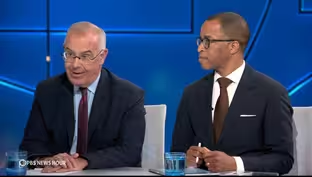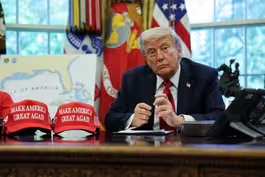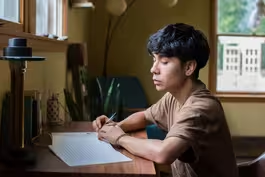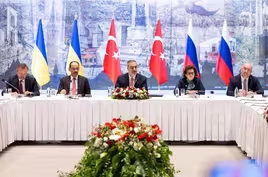
Gene editing treatment helps child born with rare disorder
Clip: 5/16/2025 | 6m 43sVideo has Closed Captions
Breakthrough gene editing treatment helps child born with rare disorder
Doctors announced this week that they have treated a newborn baby with a rare genetic disease using the world’s first personalized gene editing therapy. Geoff Bennett discussed the treatment and its potential with Dr. Peter Marks. He oversaw gene therapy treatment and vaccine safety and approval for the FDA before he left in March.
Problems playing video? | Closed Captioning Feedback
Problems playing video? | Closed Captioning Feedback
Major corporate funding for the PBS News Hour is provided by BDO, BNSF, Consumer Cellular, American Cruise Lines, and Raymond James. Funding for the PBS NewsHour Weekend is provided by...

Gene editing treatment helps child born with rare disorder
Clip: 5/16/2025 | 6m 43sVideo has Closed Captions
Doctors announced this week that they have treated a newborn baby with a rare genetic disease using the world’s first personalized gene editing therapy. Geoff Bennett discussed the treatment and its potential with Dr. Peter Marks. He oversaw gene therapy treatment and vaccine safety and approval for the FDA before he left in March.
Problems playing video? | Closed Captioning Feedback
How to Watch PBS News Hour
PBS News Hour is available to stream on pbs.org and the free PBS App, available on iPhone, Apple TV, Android TV, Android smartphones, Amazon Fire TV, Amazon Fire Tablet, Roku, Samsung Smart TV, and Vizio.
Providing Support for PBS.org
Learn Moreabout PBS online sponsorshipGEOFF BENNETT: Let's turn now to a promising medical breakthrough.
Doctors announced this week they have treated a newborn baby with a rare genetic disease using the world's first personalized gene editing treatment.
In the arms of his parents, Nicole and Kyle, K.J.
Muldoon looks much like any other happy, healthy 9-month-old baby.
But just days after he was born, his parents were initially given alarming parents.
KYLE MULDOON, Father of K.J.
Muldoon: One of the doctors came to us and said: "We think we know what's wrong.
Your son is very sick.
But the best place in the world for your child to be when he's very sick is next door."
GEOFF BENNETT: Doctors at the Children's Hospital of Philadelphia told them that their son had a rare genetic disease known as CPS1.
It only affects one in 1.3 million babies, but the disease caused by a single mutation in his DNA meant their child's body couldn't process ammonia and doctors had to carefully restrict protein in his diet.
NICOLE MULDOON, Mother of K.J.
Muldoon: You Google CPS1 deficiency and it's either fatality rate or liver transplant.
GEOFF BENNETT: The choices were stark.
KYLE MULDOON: Our child is sick.
We either have to get a liver transplant or do this -- give him this medicine that's never been given to anybody before, right?
I mean, what an impossible decision to make.
GEOFF BENNETT: Doctors told them they could try a new experimental procedure with K.J., one that had been in the works for years.
Doctors used the gene editing technology known as CRISPR to isolate and correct that single mutation.
In essence, CRISPR technology was used as a kind of GPS to go into the baby's DNA and use an enzyme to fix just one errant letter out of about three billion in his DNA.
DR. REBECCA AHRENS-NICKLAS, Children's Hospital of Philadelphia: Therapies quickly is essential.
GEOFF BENNETT: Dr. Rebecca Ahrens-Nicklas was one of the leaders of the team.
DR. REBECCA AHRENS-NICKLAS: K.J., we knew that every day that passed there was another risk that he could have neurologic injury from an elevated ammonia episode.
And so as every day passed, we knew we had to work quickly in order to try to get a solution for him.
GEOFF BENNETT: K.J.
responded well, and after follow-up treatments, doctors say he's made significant progress.
NICOLE MULDOON: We have been operating in fight or flight for so long that... KYLE MULDOON: Yes.
Yes.
NICOLE MULDOON: ... that positive things still look forward to, we kind of were just like, let's get him to this.
Now it's like we're planning for him to come home.
GEOFF BENNETT: For more on this treatment and its potential, we're joined now by Dr. Peter Marks, who oversaw gene therapy treatment and vaccine safety and approval for the FDA before he left in March.
It's great to have you here.
Thanks for coming in.
DR. PETER MARKS, Former Director, FDA Center for Biologics Evaluation and Research: Thanks so much.
GEOFF BENNETT: So explain a bit more about what doctors were able to accomplish here.
How big a deal is this?
DR. PETER MARKS: Yes, I think it's a pretty big deal because they were able to go from making a diagnosis remarkably rapidly at the genetic level by using genetic sequencing, which built on decades of work, to be able to get a genetic sequence that rapidly at reasonably low cost, and then taking that sequence and making a medicine within a matter of weeks' time to be able to treat a child before they suffer the consequences of a potentially life-ending disease.
So, really a tour de force of molecular medicine applied and making a difference.
GEOFF BENNETT: A tour de force.
I mean, what are the implications?
Can this be scaled and what other illnesses or diseases can it be used to treat?
DR. PETER MARKS: Yes, so I think this really can be scaled.
It may take a little bit of time to get there, but, by scaling it, we should be able to treat a lot of cases like this where there are N of ones, one individual affected by a very bad disease, but we also will be able to scale this up to deal with other diseases which are more common, things like sickle cell disease, et cetera.
And this approach of being able to have a gene editor given directly to someone may really bring down the cost and the complexity of gene therapy, so that it can be applied much more broadly, both here in the United States, as well as globally.
GEOFF BENNETT: And you have worked in this field for a while.
What are the caveats and limitations that we should keep in mind?
DR. PETER MARKS: So this is not going to be able to be applied immediately to every genetic disease.
There are some challenges which people are working to overcome.
Getting these kind of gene editors into the brain, where there are any number of diseases which we'd like to approach things, like Huntington's disease, et cetera, they may be a little bit more difficult, but I think we will get there.
Again, some of the challenges will take a little more time to overcome.
I think the scale-up, the technology will be important, but another piece will be the education that's necessary so that people can have the acceptance of the fact that these are remarkably good technologies which can really potentially positively benefit human health in a way that we just haven't seen previously.
GEOFF BENNETT: Are there ethical questions or are there potential questions about this kind of treatment being available to people who are affluent or people who have good private insurance, while others would have to be left to fend for themselves?
DR. PETER MARKS: Yes, I think that's a really important discussion to be had.
And I think one of the reasons why this technology is so exciting, at least to me, is that it has the potential to bring down the cost of gene therapy, which people might know, many of the gene therapies now are in the millions of dollars, a whole order of magnitude.
So this is in the -- hopefully, first -- the next step will be into the hundred thousand of dollars and then hopefully into the tens of thousands of dollars.
Could be a huge game changer, because we could see these types of gene therapies making their way into low- and middle-income countries, where they could essentially leapfrog care and help people, for instance, with sickle cell disease, where, right now, there's just nothing for them.
GEOFF BENNETT: To what degree is the administration's cuts to medical research and funding, to what degree does that limit the potential here?
DR. PETER MARKS: Hopefully, it's not going to a whole lot.
I think it is going to be a challenge.
I think, if we don't maintain leadership in this area, it will be taken over by other countries.
I think there are plenty of other countries that are looking at this technology.
They realize its potential, and they will move forward with it.
So, right now, the U.S. has had tremendous leadership in this area.
One of the people who discovered this technology, put it forward and the people who have brought it forward, located in California and MIT, they really have helped us stay in a leadership position in the U.S.
If we see that, I suspect others will move it forward.
GEOFF BENNETT: It's an exciting advancement.
Dr. Peter Marks, thanks for coming in.
Good to speak with you.
DR. PETER MARKS: Thank you so much.
Brooks and Capehart on Trump's Middle East policy shifts
Video has Closed Captions
Clip: 5/16/2025 | 10m 41s | Brooks and Capehart on Trump's Middle East policy shifts (10m 41s)
How the Trump family could be profiting off the presidency
Video has Closed Captions
Clip: 5/16/2025 | 9m 12s | Trump business deals revive questions about his family profiting off the presidency (9m 12s)
News Wrap: Israel strikes Houthi-controlled ports in Yemen
Video has Closed Captions
Clip: 5/16/2025 | 8m 38s | News Wrap: Israel strikes two Houthi-controlled ports and unleashes new barrage on Gaza (8m 38s)
Ocean Vuong explores chosen family and kindness in new novel
Video has Closed Captions
Clip: 5/16/2025 | 6m 54s | In 'The Emperor of Gladness,' Ocean Vuong explores chosen family and acts of kindness (6m 54s)
Russia-Ukraine talks fall flat with few signs of progress
Video has Closed Captions
Clip: 5/16/2025 | 8m 45s | Russia-Ukraine peace talks fall flat with few signs of progress (8m 45s)
Providing Support for PBS.org
Learn Moreabout PBS online sponsorshipSupport for PBS provided by:
Major corporate funding for the PBS News Hour is provided by BDO, BNSF, Consumer Cellular, American Cruise Lines, and Raymond James. Funding for the PBS NewsHour Weekend is provided by...
















